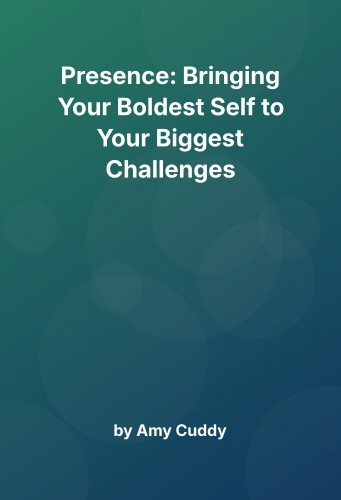Presence: Bringing Your Boldest Self to Your Biggest Challenges
By Amy Cuddy
Introduction
In Presence, psychologist Amy Cuddy shares research and practical insights on how to bring your authentic, powerful self to high-stakes situations. Known for her TED Talk on “power posing,” Cuddy expands her message into a broader exploration of confidence, embodiment, and self-trust.
Presence is not about being dominant — it’s about being fully in the moment, aligned with your values, and free from fear. Drawing from psychology, neuroscience, and personal stories, Cuddy teaches how presence can be cultivated and why it matters.
What Is Presence?
Presence is the state of:
- Being attuned to yourself and your values
- Feeling calm and confident, even in uncertainty
- Behaving in ways that reflect who you truly are
Presence leads to better performance, stronger impressions, and reduced anxiety in interviews, speeches, negotiations, and other social evaluations.
It’s not about faking confidence — it’s about finding and accessing your real power.
The Body-Mind Connection
Cuddy builds on the concept of embodied cognition — the idea that our body affects how we think and feel, not just the other way around.
Her research shows that adopting “expansive postures” (e.g., standing tall with open arms) can:
- Increase testosterone (linked to confidence)
- Decrease cortisol (linked to stress)
- Improve risk tolerance
- Shift subjective feelings of power
“Power posing” helps people feel more capable, not because it changes who they are, but because it helps them access who they already are.
Impostor Syndrome and Self-Doubt
Cuddy discusses impostor syndrome — the fear of being exposed as a fraud, even when competent. This often strikes high achievers and underrepresented individuals in elite spaces.
Presence dissolves impostor syndrome by:
- Encouraging self-acceptance
- Shifting focus from impression management to contribution
- Emphasizing preparation and embodiment over perfection
The antidote to feeling like a fraud is showing up as yourself, not as who you think others want.
Performing Under Pressure
High-pressure situations can trigger fight-or-flight responses, narrowing focus and causing performance anxiety.
Cuddy shares techniques for regaining presence:
- Power posing before the event (backstage, restroom, etc.)
- Visualization of success and groundedness
- Self-affirmations (“I am…” statements)
- Focusing on purpose over outcome
The key is shifting from “Will I impress them?” to “How can I contribute?”
Authenticity and Trust
Presence builds trust, because people sense congruence between your words, actions, and energy.
Authentic leaders:
- Show vulnerability appropriately
- Speak from personal values
- Make eye contact and use natural gestures
- Are consistent over time
Cuddy emphasizes that presence isn’t a mask — it’s the opposite of performance. It’s about reclaiming your right to be heard, exactly as you are.
Power vs. Presence
Cuddy differentiates between power over others and personal power:
- Power over: dominance, coercion, hierarchy
- Personal power: agency, authenticity, grounded confidence
Presence taps into personal power. It’s internally driven, values-based, and not dependent on status or approval.
When we express presence, others feel safe and inspired — not intimidated.
Presence in Daily Life
Cuddy offers real-world applications:
- In meetings: speak early, breathe deeply, sit upright
- In interviews: prepare stories, use expansive posture beforehand
- In conversations: listen actively, reduce filler words
- In relationships: validate others without compromising yourself
Even small adjustments — pausing to breathe, standing tall, making deliberate eye contact — can dramatically change interactions.
Personal Stories and Diversity
Cuddy shares stories from trauma survivors, job seekers, athletes, and marginalized individuals who used presence practices to reclaim their voice.
She is especially sensitive to how race, gender, and power dynamics shape the experience of presence. Her message: presence is not just for the confident and privileged — it’s a tool for liberation and inclusion.
The Role of Warmth and Competence
Drawing from social psychology, Cuddy explains that people judge us on two dimensions:
- Warmth (trustworthiness, friendliness)
- Competence (ability, skill)
Presence increases both, but warmth is the stronger predictor of influence and connection.
Being present allows us to project warmth without seeming weak, and competence without seeming cold.
Developing Presence Over Time
Cuddy stresses that presence is a practice:
- It requires reflection, especially on values
- It thrives on feedback and iteration
- It grows when we take risks
You don’t have to feel powerful to act present. Acting “as if” you belong can train your brain to believe it.
Key Takeaways
- Presence is the alignment of mind, body, and values — especially under pressure.
- Your posture and body language influence your thoughts, emotions, and outcomes.
- You can combat self-doubt and anxiety by focusing on purpose, not approval.
- Presence builds trust, connection, and authenticity in every context.
- It’s not about being the loudest — it’s about being the clearest version of yourself.
Presence is both inspiring and practical — a guide to showing up, standing tall, and speaking with conviction. Amy Cuddy teaches us how to feel at home in our own skin — and how that simple shift can transform everything.

